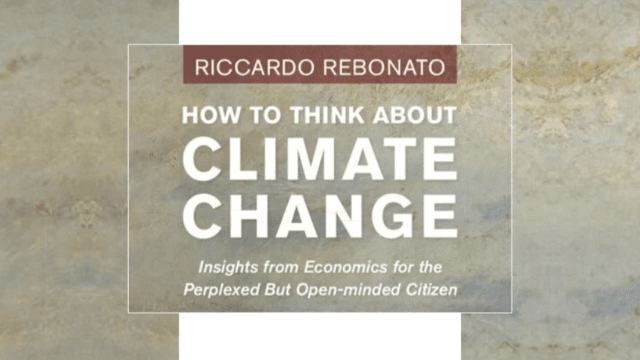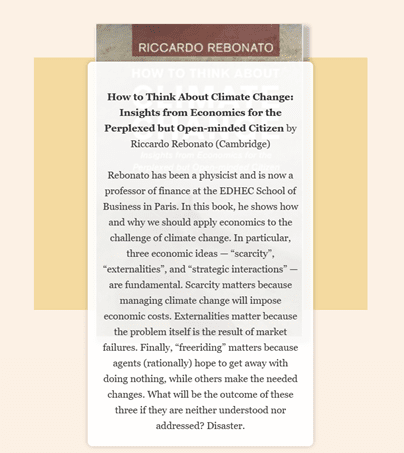Riccardo Rebonato’s Book on Climate Economics Recognized by the Financial Times
This article was first published on the edhec.edu website - 01/12/2024
We are delighted to announce that Riccardo Rebonato’s recent book, "How to Think About Climate Change: Insights from Economics for the Perplexed but Open-minded Citizen", has been selected as one of the best economics books of the year by Martin Wolf in the Financial Times.
A clear framework for tackling climate policy
In this insightful publication, Riccardo Rebonato, Professor at EDHEC Business School and Scientific Director of the EDHEC-Risk Climate Impact Institute, explores how economics provides indispensable tools for addressing the policy challenges posed by climate change.
By examining critical concepts, Riccardo Rebonato offers readers a structured framework to navigate the complexities of climate policy. As the Financial Times highlights, three key economic ideas are at the core of his analysis:
- Resource scarcity: Understanding how to allocate limited resources most efficiently
- Negative externalities: Tackling what has been called the greatest externality in human history – the inability of those affected by carbon emissions to bargain for compensation.
- The free-rider problem: Addressing the challenge of individuals or nations benefiting from others’ climate actions without contributing themselves.
What happens if these realities are not understood or addressed? Disaster.
Equipping policymakers, professionals, and concerned citizens
The book is particularly praised for its accessibility to non-specialists. Avoiding complex mathematics, it introduces readers to cutting-edge Integrated Assessment Models and demonstrates how modern economic approaches support rapid and decisive decarbonization action to achieve the Paris Agreement targets. Despite not having been written as a textbook, Rebonato’s book has been adopted as course material in European universities for its clarity and accessibility.
"I intend to show that the analytical tools provided by economics can help the interested layperson reach her own conclusions about how we should tackle the policy challenges posed by climate change," says Riccardo Rebonato
Endorsed by experts across disciplines
The book has received glowing reviews from academic and professional experts in the fields of economics and climate science:
Francis X. Diebold, Professor of Economics, Finance and Statistics at the University of Pennsylvania, says: 'Riccardo Rebonato has done it again! Notwithstanding its humble title, his latest book is filled with rich insights from the interface of economics and climate science, for both the concerned citizen and the seasoned expert. It's all there: the economics and the climate science, the facts and the models, the costs and the benefits. Rebonato offers uniquely-informed economic insights on mitigation, adaptation, new technologies, and open questions.'
Marcos Lopez de Prado, Global Head of Quantitative R&D at the Abu Dhabi Investment Authority and MIT Connection Science Fellow, adds: 'Anthropogenic climate change is a market failure, and its solution will require close collaboration between physicists and economists. Professor Rebonato's unique background as a trained physicist and a world-renowned finance expert shines through in this wonderful book, making it one of the most authoritative treatments of this subject possible.'
Alexander Lipton, ADIA Lab, notes: 'Riccardo Rebonato is a well-known practitioner, author, and economist. He is celebrated for his insightful contributions to financial engineering, economic modeling, and climate change discourse, habitually offering fresh perspectives on complex global challenges. How To Think About Climate Change empowers readers to confront the climate crisis with renewed understanding and purpose. Rebonato's book is essential for anyone seeking an enlightened and actionable perspective on one of the most pressing issues of our time.'
A recognition that matters
The recognition by the Financial Times underscores the importance of Riccardo Rebonato’s work at the intersection of economics and climate, providing a much-needed analytical lens for finance professionals, policymakers, and concerned citizens.
For more details on the book and its groundbreaking perspectives, visit the Cambridge University Press website or explore Riccardo’s article “How to Think About Climate Change”, published on EDHEC Vox.
To know more about Riccardo Rebonato:
- Go to his Google Scholar webpage
- Visit his EDHEC's profile
- Read his latest articles published in EDHEC Vox :
- The problems with climate scenarios, and how to fix them (July 2024)
- A Conversation with Robert Litterman (Kepos) and Riccardo Rebonato (EDHEC): Fighting Climate Change Through Financial Innovation (May 2024)
- How to think about climate change? (April 2024)
- Meet Riccardo Rebonato, a fusion of science and finance (January 2024)

Comments0
Please log in to see or add a comment
Suggested Articles



